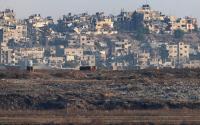Published on Wednesday, April 27, 2005 by Knight-RidderDogen Hannah
After risking their lives to vote and then watching the political leaders they elected haggle fruitlessly for almost three months, many Iraqis have concluded that their new national assembly is incapable of producing a government that can unify and pacify the country.
On Monday the politicians failed again to negotiate a coalition government, following earlier predictions that they would succeed.
Even when they finally do, the hard part will come after they've formed a government. They'll face daunting challenges to their cohesiveness, and Iraq's Shiite Muslim leaders will have to run a country dangerously close to splintering.
"It is not a national government. It is a sectarian government," said Nuaman al Shamiree, 24, while working at a central Baghdad kebab stand.
Since the Jan. 30 election, Iraq's major political factions have been jockeying for key government positions. Secular and religious, Shiite, Kurdish and Sunni leaders have yet to agree on who should run 31 ministries and serve in the three deputy prime minister posts.
Meanwhile, insurgents have staged a series of bloody attacks after what seemed to be a post-election lull, possibly aiming to take advantage of the political uncertainty. They've attacked military, civilian, Iraqi and foreign targets with coordinated bombings and well-planned assaults.
Bombs have ripped into Shiite neighborhoods and mosques, including two closely timed blasts in Baghdad that killed at least 15 people Sunday night. Shiites and Sunnis have swapped threats and accusations of attacks and reprisals.
U.S. Secretary of State Condoleezza Rice has, in recent days, had contacts with a number of Iraqi leaders to discuss the situation, State Department spokesman Adam Ereli said Monday. She urged Iraqis to speed up their efforts to form a government.
A U.S. Embassy official in Baghdad, speaking on condition of anonymity, said increased insurgent attacks in the last two weeks have reinforced the need to fill the political vacuum.
"There's a need to get a transitional government up quickly and get leadership back up in Baghdad," the official said.
The Shiites' reaction to the attacks has so far been restrained, but that might change.
On Monday, in the southern city of Najaf, hundreds gathered for the funeral of 19 Shiite fishermen who were kidnapped and executed in Sunni-dominated western Iraq. The crowd chanted, "Sunnis are the enemy of Allah" and "Where is the government? Where is the law?" Some said they were close to striking back.
"We're waiting for orders from the marjaiya," said Jassim Ubaidi, referring to the council of top Shiite clerics in Iraq, which so far has counseled moderation. "We're more than them (Sunnis) by number and force. We have thousands, and we can respond."
Amid the turmoil, the laborious bargaining to create a governing coalition of political, ethnic and sectarian groups looks like a waste of time to many Iraqis.
"We wanted that election. We had that election. What happened? Nothing," said al Shamiree. "What do we want from the government? We want security and we want jobs."
Shiites constitute about 60 percent of Iraq's 26 million people. Sunnis, who were favored by Saddam Hussein and who largely boycotted the election, constitute about 15 percent to 20 percent. Kurds, who mostly live in the north and were oppressed under Saddam, constitute about 20 percent.
The United Iraqi Alliance, a coalition backed by top Shiite religious leaders in Iraq, was the election's big winner with 140 assembly seats. That falls short, however, of the two-thirds needed to get government ministers and deputies submitted by incoming Prime Minister Ibrahim al Jaafari of the UIA approved by the assembly.
That's forced Jaafari's coalition to bargain with Kurdish- and Sunni-led coalitions, which together have 80 seats. His coalition also has sat down with that of outgoing Prime Minister Ayad Allawi, a secular Shiite whose party placed third in the election with 40 seats.
Political leaders have said that the closed-door talks are an effort to unite the nation, not just form a coalition.
"What we are working on is to involve all the Iraqi components and factions of the society in the government," said Saad Jawad Kandeel, of the UIA and the Supreme Council for the Islamic Revolution in Iraq, an Iran-backed Shiite group.
Sunnis largely shunned the election and won few assembly seats, but including them is critical to softening the Sunni-led insurgency and ensuring the effectiveness of key government functions. Excluding them from the Cabinet could fuel political instability and sectarian conflict.
"Should we ignore them in the constitution or the government?" asked Rassim al Awadi, a negotiator for Allawi's coalition, the Iraqi List. "If we did that, we would divide the Iraqi people, and that would be a catastrophe."
Yet political scientist Nadhum Jasour, of Baghdad University, says negotiating to include the Sunnis risks setting a troubling precedent.
"This issue is very dangerous, especially with the appearance of some powers outside the assembly that are looking for positions in the new government," Jasour said.
The ethnic and sectarian accommodations also chip away at the idea that Iraq is a unified nation, more important than any ethnic group.
Job seekers worry that sectarian, ethnic and political affiliations will trump experience and expertise when it comes to ministry jobs, for instance. Others worry that divisions in the army and security forces will lead to unequal treatment.
"What's the difference between this regime and Saddam Hussein's regime?" said Baghdad resident Haider Saleh, 30, a mobile phone store owner. "Saddam's regime was a sectarian system, and this regime is a sectarian system."
Other observers are cautiously optimistic.
Iraqis are willing to give political leaders some leeway and support an apportioned Cabinet, provided the government makes progress in quelling the insurgency and solving the nation's other woes, said political scientist Mazin al Ramadani of Baghdad University.
But politicians must act swiftly.
"The people will lose their confidence if the formation of this government takes longer," al Ramadani said.
Knight Ridder special correspondents Huda Ahmed, Yasser Salihee and Qassim Zein and a special correspondent who can't be named for security reasons contributed to this report.






